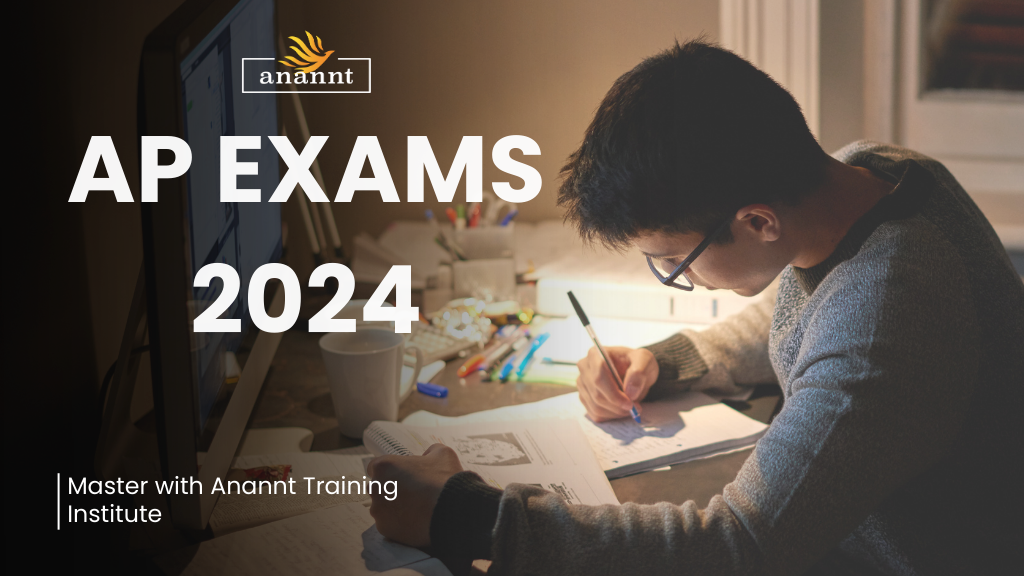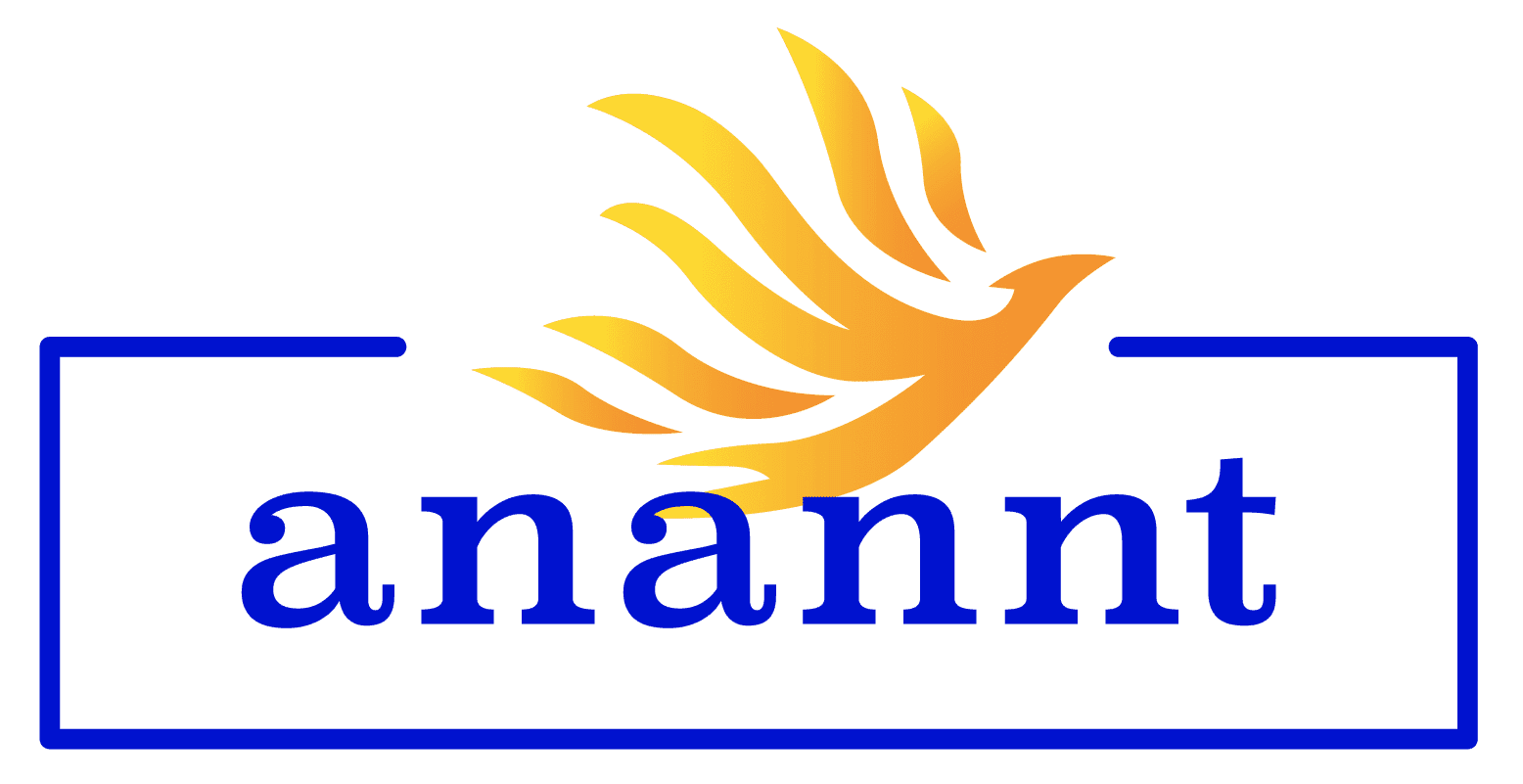
by Ishan | Jan 24, 2024 | advanced placement, AP, Tips
Introduction:
Start Your AP Exam 2024 Adventure with Anannt Institute
Looking to shine in the AP Exams 2024? Anannt Training Institute is here to help! We provide a clear guide for everything you need to know. This is great for high school students, homeschoolers, and graduates.
Understanding AP Exams:
What Are AP Exams?
The College Board runs the AP Exams. They’re key for high school students to earn college credits. These tests challenge your understanding of college subjects, highlighting your academic strengths.
Eligibility for AP Exams in 2024:
Who Can Join?
Anyone in these groups can take the AP Exams 2024:
- Students in regular schools.
- Homeschoolers or students studying online or independently.
- Young talents ready for exams before ninth grade.
- Graduates needing an AP Exam for college.
AP Exam 2024 Schedule:
Key Dates to Remember
Don’t forget to check the AP Exam 2024 schedule here. It’s vital for your preparation.
AP Exam Rules:
Understanding the Policies
- Physics Exams: You can take up to all four physics exams in the same year.
- Retake Policy: Retaking an exam is possible, but only in a subsequent year, not the same one.
- Calculus Rule: Choose between Calculus AB or BC each year, but not both.
- Precalculus Option: Now, you can take Precalculus with either Calculus AB or BC in the same year.
- Scheduling: If two exams clash, pick one and schedule the other in the next available window.
- AP Computer Science Principles: Enrollment in the respective course and submission of portfolio work are required.
- Exam Format: Exams are paper-and-pencil based, conducted in person. No digital options for students outside the U.S. at this moment.
Join us at Anannt Training Institute for a seamless AP Exams 2024 preparation. For more Insights, visit Anannt website. Start your educational journey towards excellence with us today!

by Om | Jan 23, 2024 | advanced placement, AP, Test, Tips
Easy Guide to AP Exam Registration
Starting Your AP Journey AP exams are a big step in high school. The College Board offers these exams. https://ap.collegeboard.org/
Understanding AP Exams AP exams are tests in college subjects. Doing well in them can give you college credits. It’s good to choose exams that you are good at and like.
Guide to Registering for AP Exams
Talking to Your AP Coordinator First, talk to your school’s AP coordinator. They’ll tell you how to sign up and when.
Choosing Your Exams Next, pick AP exams that match your goals. This is important for your studies.
Signing Up Online Then, sign up in the fall on the College Board’s website.
Handling the Fees Remember, AP exams cost money. If you need help paying, ask your school about financial aid.
Checking Your Registration Finally, make sure your sign-up details are correct, like your exam dates and places.
Getting Ready for the Exams
Making a Study Plan After signing up, start studying. Make a plan that covers all your AP subjects.
Using Study Materials Use study guides, online resources, and class notes to prepare.
Practicing with Tests Also, practice with old exams to get ready for the real thing.
Tips for Exam Day
Arriving on Time On exam day, get there early. Bring pencils, a calculator (if you can), and your ID.
Staying Calm Stay calm during the exam. Manage your time well.
Conclusion: You’re Set for AP Exams Now you know how to sign up for and prepare for AP exams. Good luck!
For more Insights, visit Anannt website. Embark on this exciting educational journey today!

by Om | Jan 23, 2024 | advanced placement, AP, Course, Test, Tips
Introduction to AP Courses
Advanced Placement (AP) courses are great for high school students. They help improve your academic skills. Anannt Training Institute makes learning these courses easy and fun. For more details on AP courses and their benefits, visit the College Board’s AP Central
Benefits of Taking AP Courses
- Earn Early College Credits: First, AP courses let you get college credits. This makes your college life easier.
- Get Ready for College: Next, they get you ready for college studies. This means a smoother start to college.
- Boost Your College Application: Also, doing well in AP courses helps your college applications shine.
- Explore Different Subjects: Besides, these courses let you learn about many topics. You can find new things you like.
Challenges in AP Courses
- More Work Involved: But, AP courses mean more work. Sometimes, this can be stressful.
- Costs of Exams: Remember, each AP exam costs money. These fees can add up.
- Credit Acceptance Varies: Not all colleges accept AP credits in the same way.
- Possible Impact on GPA: Finally, tough AP courses might lower your grades.
Why Choose Anannt Training Institute?
- Expert Teachers: Our teachers really know the AP subjects.
- Learning That Fits You: We teach in ways that work best for you.
- Guidance on Course Choices: We help you pick the right AP courses for your goals.
- Stress Management: We also teach you how to handle more work without stress.
Conclusion To sum up, AP courses are a smart way to prepare for college. Anannt Training Institute is here to help you all the way. We make these courses easier and more useful for you.
For more Insights, visit Anannt website. Embark on this exciting educational journey today!

by Ishan | Jan 23, 2024 | advanced placement, AP, Biology, Course
Brought to You by Anannt Training Institute
Welcome to Anannt Training Institute, your starting point for AP exam excellence. Here, we emphasize the importance of AP past papers for effective preparation. Indeed, these resources are vital.
Harnessing the Power of AP Past Papers
Easily Accessible Resources for AP Exam Preparation
Firstly, accessing past AP exam papers is easy and highly beneficial. For instance, you can find them on the College Board’s official website. These papers are crucial for understanding exam patterns and key topics. Additionally, practicing with them improves your skills and boosts confidence. To begin, Check here.
Comprehensive AP Courses Tailored for You
Moreover, we offer a wide range of AP courses, from Biology to Calculus. Importantly, our courses are designed for thorough learning and preparation. To find the right course for you, click here.
Empowering Students Through Our Courses:
Also, our courses do more than teach. They empower you with knowledge and confidence. Furthermore, we focus on interactive and practical learning. This prepares you thoroughly for your AP exams.
Lastly, for more insights, visit Anannt’s website. Together, let’s embark on a journey to academic success in AP exams. With Anannt, you’ll unlock your full potential using the best tools and expertise.
For more insights, visit Anannt website.

by Ishan | Jan 23, 2024 | advanced placement, AP
Introduction: Embarking on the 8-Week AP Microeconomics Syllabus Plan
Begin your educational adventure with Anannt Training Institute’s 8-Week AP Microeconomics Syllabus Plan. This accelerated study plan is skillfully crafted to boost your AP exam prep. It offers a clear, focused path to mastering the essentials of microeconomics.
Week 1-8: Mastering the AP Microeconomics Syllabus
Week 1: Basic Economic Concepts
- Focus: Explore scarcity, resource allocation, and economic systems.
- Activities: Interactive discussions on scarcity; analysis of different economic systems.
Week 2: Production, Trade, and Decision Making
- Focus: Production Possibilities Curve, Comparative Advantage, and Cost-Benefit Analysis.
- Activities: Curve analysis; comparative advantage scenarios; cost-benefit exercises.
Week 3: Supply, Demand, and Market Dynamics
- Focus: Understanding demand and supply, market equilibrium, and elasticity.
- Activities: Demand and supply curve exercises; elasticity calculations.
Week 4: Government in Markets and International Trade
- Focus: Effects of government policies, and international trade impacts.
- Activities: Case studies on government intervention; trade policy analysis.
Week 5: Production Costs and Perfect Competition
- Focus: Short- and long-run production costs; exploring perfect competition.
- Activities: Cost structure analysis; perfect competition market simulations.
Week 6: Imperfect Competition and Market Structures
- Focus: Monopoly, monopolistic competition, oligopoly, game theory.
- Activities: Analysis of different market structures; strategic game exercises.
Week 7: Factor Markets and Profit Maximization
- Focus: Delving into factor markets, and profit maximization in competitive markets.
- Activities: Factor market scenarios; profit strategy discussions.
Week 8: Market Failure and Government’s Role
- Focus: Understanding market failures, externalities, and government interventions.
- Activities: Discussions on externalities; role of government in markets.
Also, explore the Microeconomics course for additional insights.
Conclusion: Efficient and Effective AP Exam Prep
Our AP Syllabus Plan at Anannt Training Institute paves the way for excellence in AP Microeconomics. Efficiently covering essential topics, this plan ensures you are thoroughly prepared for the AP exam.
Take the Leap: Join Anannt’s AP Courses
Join us at Anannt Training Institute to fast-track your AP exam preparation.
For more Insights, visit Anannt website. Embark on this exciting educational journey today!

by Nabeela | Dec 21, 2022 | AP, Test, Tips
AP English Literature and Composition is a rigorous course designed to help
students sharpen their skills in analyzing, reading, and writing literature. It is
usually offered at high school level and gives learners the opportunity to
explore various facets of literature.
What’s the main focus?
The main focus of AP English Literature and Composition is on developing
essential critical reading, writing, and thinking abilities which are necessary for
understanding literature’s intricacies. Students will read several
texts including stories, plays, poems, and novels. They have an emphasis on their
structure, style, themes, symbols, characters, as well as other literary
elements. Although many high schoolers may not be looking forward to taking AP, due to
the hard work and stress associated with it. They might be surprised by the results
if they take this course seriously. In fact, AP English Lit can be a worthwhile experience!
The Course
In AP English Lit students will come across classic works from British as well as
American authors like Austen, Twain, Milton or Shakespeare etc. Apart from
that students would learn about all aspects that go into producing a good
piece of literature like plot development, character analysis or theme etc.
Benefits
Enrolling in AP English Literature has many benefits; this course may assist
you prepare for college-level English classes but it may also give you a
better understanding of how to craft effective pieces both academically
as well as creatively. Furthermore studying great literary pieces can
help expand your perspective on life and how you perceive the world around you.
Exam
At the conclusion of the course one needs to sit for an AP exam which tests
knowledge acquired throughout the year. Even though it may appear
intimidating initially but with adequate preparation and dedication any student
can excel at this assessment!
Overall taking AP English Lit is a fantastic chance for high school students
who wish to gain valuable learning experiences which will help them achieve
success both in college or even beyond that! So if you are considering
enrolling in this course don’t let fear stop you – take it head-on!
For more information check out check out our website https://anannt.com/advanced-placement-ap-preparation/







Recent Comments